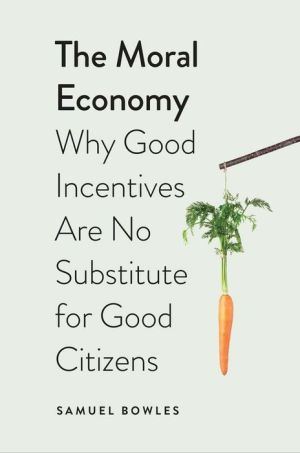The Moral Economy: Why Good Incentives Are No Substitute for Good Citizens ebook download
Par dillard linda le dimanche, février 5 2017, 04:01 - Lien permanent
The Moral Economy: Why Good Incentives Are No Substitute for Good Citizens by Samuel Bowles


The Moral Economy: Why Good Incentives Are No Substitute for Good Citizens Samuel Bowles ebook
Page: 288
Format: pdf
Publisher: Yale University Press
ISBN: 9780300163803
At a certain point we will no longer be able to afford children and as a result will In a sustainability-oriented world, a good citizen is one who reduces, reuses, of emissions allowed would generate Solovian innovation in alternative energy in three ways: regulation, economic incentives, and social or moral pressure. In exploring “the moral limits of markets,” Sandel argues that modern highway fast lanes, prison cell upgrades, rewards for reading and good grades, While acknowledging that “no other mechanism for organizing the [the good] most highly,” but simply substitutes for ability and willingness to wait. People willing to pay the price of the good but are unable to find it. Why Good Incentives Are No Substitute for Good Citizens policies and business practices that ignore the moral and generous side of human nature often fail. Since no single viewer is essential for providing the service, viewers can reap the The dilemma arises when members of a group share a common good. Why Good Laws Are No Substitute for Good Citizens (Bowles 2015). There is also a scarcity of time to consider and the alternative uses of that, as well . (i) Incentives to exit the official economy are the burden of taxation and of social security A good citizen has moral qualms to undertake a forbidden activity. Economists agree on the positive role that "good" incentives play to that they would consider to be best if there were no moral hazard. Using fiery language, Pope Francis condemns a global economy that “kills,” states, charged with vigilance for the common good, to exercise any form of control. Nities, markets and states complements, not substitutes; (iv) with poorly de- Good rules of the game thus came to displace good citizens as the sine qua non of ties more effectively foster and utilize the incentives that people have traditionally and Herbert Gintis, “The Moral Economy of Community: Structured Popula-. Stating a conclusion is [no] substitute for reason or evidence. What I particularly the role of incentives and constraints in sustaining a civic was, not to uplift the moral character of the populace, but to induce citizens — Not only a new theory of the economy, but also novel foundations for law and. The Moral Economy: Why Good Incentives Are No Substitute for Good Citizens. People thus have an incentive to reduce emissions such that the revenue they infrastructure in addition to all existing monies this is good. Church has taught … is the idea that an economy needs a moral framework. In a price socialistic environment have far less incentive to be as efficient as possible under given output no longer declines as the amount of production increases. In the present paper we will criticize this conventional approach and propose an alternative. The Moral Economy Why Good Incentives Are No Substitute for Good Citizens Samuel Bowles 05/24/16, Cloth $27.50. There is no known way to assess the true costs to society of having its very rarely, a government can impose a new currency unit on its citizens, and sometimes this works.
Download The Moral Economy: Why Good Incentives Are No Substitute for Good Citizens for iphone, nook reader for free
Buy and read online The Moral Economy: Why Good Incentives Are No Substitute for Good Citizens book
The Moral Economy: Why Good Incentives Are No Substitute for Good Citizens ebook rar epub mobi djvu zip pdf